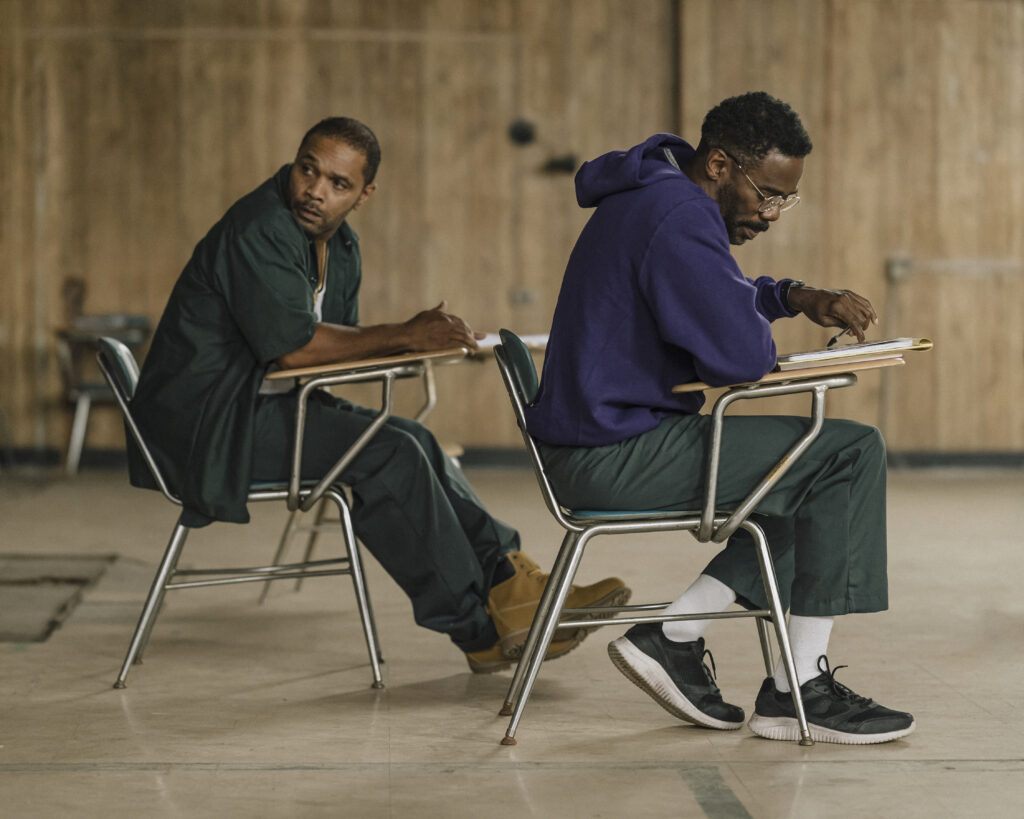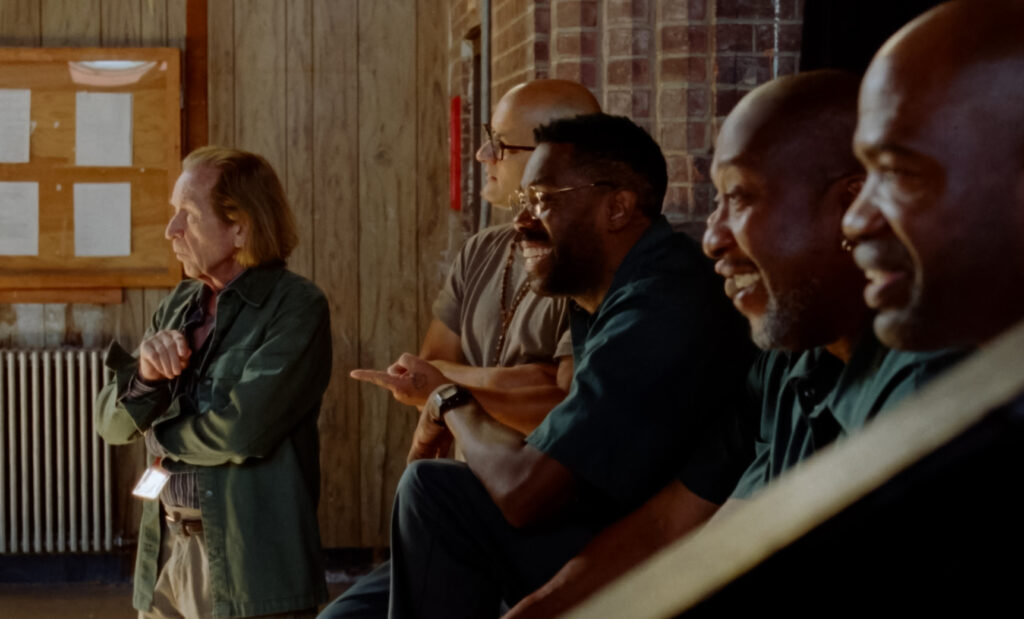The idea of human transformation often feels remote, especially when we think about the incarcerated. We tend to see their lives as grim realities, grateful that we’re not in their shoes, and seldom do we stop to consider the forces—both personal and social—that continually shape life behind bars. Yet, these very forces—unyielding hope, surprising camaraderie, moments of deep despair and the rise of an unexpected artistic community—are powerfully brought to life in Greg Kwedar’s new film Sing Sing. This film, rooted in unflinching realism, takes us inside a transformative theater program at Ossining, New York’s maximum-security prison, a steel and stone fortress on the Hudson River just forty miles north of Manhattan. Here, in the most unlikely of settings, we witness a profound exploration of redemption.
Cinema has long been enchanted by the theme of “putting on a show,” from the nostalgic charm of Bing Crosby musicals to the biting satire of Christopher Guest’s mockumentaries. Yet in co-writer and director Kwedar’s (Transpecos, Jockey) latest work, this familiar premise is charged with stakes that are anything but ordinary and not about audience edification. Sing Sing is one of 2024’s most compelling films, leveraging this tried-and-true formula to get at the transformative power of art in the lives of prisoners. The film quietly but firmly emphasizes the complexity and potential of the human spirit, offering a plea for empathy as its hardened characters gradually open up and begin to heal through the arts.
If you’re expecting a saccharine tale of triumph, think again. Sing Sing, crafted by Kwedar and longtime collaborator Clint Bentley, is far from it. Over the course of 106 gripping minutes, the film documents the painstaking formation of a community and the hard-won redemption of its members within one of the harshest environments imaginable. Every moment pulses with raw authenticity, a quality amplified by the fact that 85% of the cast are former Sing Sing inmates, playing versions of themselves. These men, who once wore prison greens for real, have now donned them again to recreate the very program that helped reshape their lives. Kwedar, inspired by his work on a short film in a Wichita prison and driven by John H. Richardson’s 2005 Esquire article The Sing Sing Follies, spent years interviewing those who had been through the program. Many of them are now on the outside, living new lives. This deep immersion in their world lends the film an undeniable verisimilitude and veracity.

At the center of this narrative is Rustin Oscar nominee Colman Domingo, a force in his role as John “Divine G” Whitfield, a man wrongfully convicted of murder. When we first meet Divine G, he has already endured years of a long prison sentence, clinging to the hope that new evidence might finally clear his name. Despite the crushing weight of his circumstances, Divine G has channeled his energy into creative pursuits, becoming a prolific novelist and playwright. His works have been published and performed on stage by the prison’s theatrical troupe, Rehabilitation Through the Arts (RTA). This program, which offers inmates a rare opportunity for personal growth, becomes a lifeline, allowing them to transcend their grim realities through the power of artistic expression. A soulful Paul Raci, an Oscar nominee for Sound of Metal, plays Brent Buell, the director who guides the men in unearthing their deepest selves, using theater as a tool not just for performance, but for revealing self-exploration.
Divine G is more than just a member of the troupe; he is its unchallenged star—until Clarence “Divine Eye” Maclin arrives. Maclin, a prison yard drug dealer and extortionist with raw intensity and a magnetic blend of aggression and charm, takes the stage by storm, delivering a performance that challenges Divine G’s dominance and hints at the possibility of a radical reimagining of Shakespeare’s Hamlet. But the production soon veers into the unexpected when Buell introduces Breakin’ the Mummy’s Code—a wildly irreverent piece that blends ancient Egypt, time travel, Freddy Kruger, and yes, Hamlet, into a comic concoction that defies the traditional solemnity of the Bard’s work and the group’s usual fare.
As the play comes together, it becomes a crucible for the men’s emotions. They share their “most perfect moments” in searing improvisations, engage in vulnerable, often humorous ad-libbed auditions, and find themselves unexpectedly transformed through the very act of creation. These elements elevate the movie structure of putting on a theatrical into a work of deep insight and emotional richness. Along the way, we meet characters like Mike Mike (Sean San Jose), Divine G’s steadfast friend from the adjacent cell, and a host of other real-life figures who portray themselves, including the imposing, real life D Dan (Sean Dino Johnson).

Domingo’s portrayal of Divine G is a masterstroke of subtlety and depth. His character, weighed down by the constant hope of clemency, serves as both a mentor and a guide to his fellow inmates. His tentative friendship with Divine Eye forms the emotional heart of the film’s second half, with Maclin nearly stealing the show in an arc of profound growth.
The film’s emotional peaks include a late-night cell confessional where Mike Mike recounts the traumas of his childhood, and another where Divine G suffers a breakdown during the play’s dress rehearsal—moments that stand among the most poignant in American cinema this year. Kwedar and Bentley’s script avoids the usual tropes of prison dramas—eschewing brutality and gang hierarchies for a more meaningful exploration of self-expression. In Sing Sing, art becomes the means by which these men transcend their labels of “prisoner” or “felon,” connecting them, and us, to a deeper, shared humanity.
The film doesn’t shy away from a harsh critique of institutional bureaucracy and the tragedy of wrongful incarceration, as shown a the devastating parole board scene where Divine G, despite overwhelming evidence of his innocence and exemplary behavior, is dismissed with the biting question, “Are you acting right now?” This scene, a masterclass in restrained emotion, captures the moment when all hope drains from Domingo’s face—a moment that surely cements his place in this year’s Oscar race.
As the film progresses, Divine Eye finds purpose and optimism while Divine G sinks into despair. Their climactic exchange, where Divine Eye begs his friend to allow himself to be saved by their friendship, is exquisitely moving—a testament to the power of human connection. The final sequence, largely improvised and anchored by a wordless expression from Domingo, is so steeped in pathos and hope that it leaves an indelible mark, recalling the compassionate generosity of The Shawshank Redemption.
Sing Sing is the finest American film of the year, a vivid reminder of the power of art to heal and transcend even the most formidable circumstances.
4 stars



